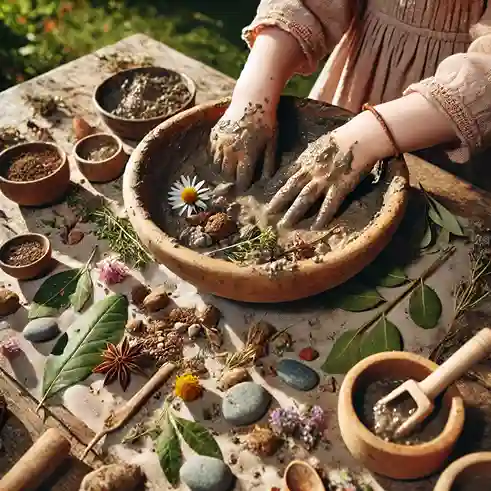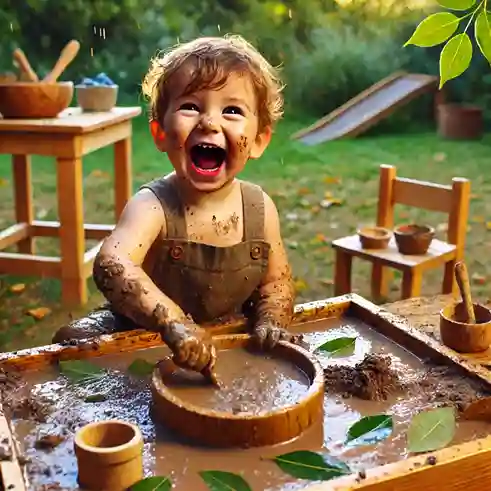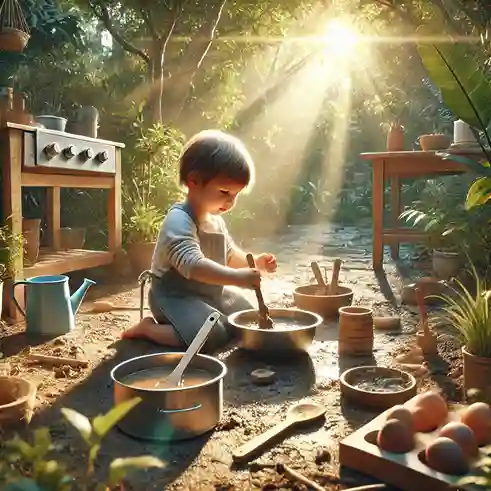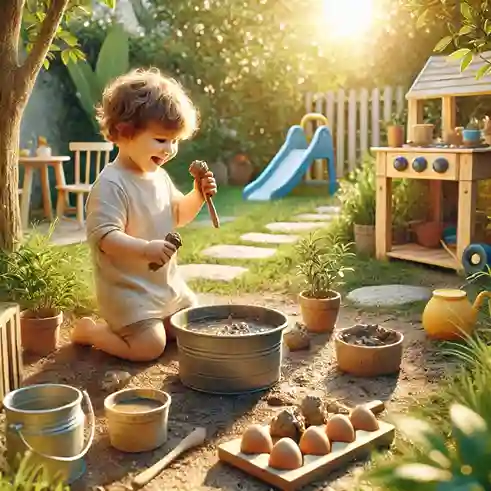Introduction to Toddler Mud Kitchen
A mud kitchen refers to a type of space that is created as a space where children, mainly toddlers, can engage in pretending to cook and look after plants with outdoor activities. The setup is quite interesting as it may contain some form of kitchen items such as fake pots, pans, utensils, and even a countertop made of wood. The purpose here is that children could bury their hands in the dirt, water, leaves, and anything else they’d like while pretending to cook. The advantage of allowing children to play like this is what has made mud kitchens so prevalent among parents and educators in the past few decades, especially in relation to childhood development.
Hands on practical activities that go hand in hand with theory is one of the leading factors that contributes to every subject and mud isn’t let down by it. When trying to compare kids whom have used a mud kitchen and those who haven’t, recessed findings indicate that kids using mud kitchens are usually much more active and social in the sense they prefer making use of their senses quite often. Experimentation through motion and change using water and mud helps children learn about change, different types of textures, and the like. Such activity based learning is highly useful during the first few years of one’s life as such activities help shape problem solving techniques along with critical thinking.
Furthermore, imaginative play is essential to childhood development as it allows the child to enact multiple characters and different situations within various environments. Therefore, by engaging pretend play within a mud kitchen, toddlers are able to articulate their thoughts, ideas, and emotions which aide their social skills and emotional intelligence. Additionally, mud kitchens promote the outdoor environment and make it easily accessible for young ones to appreciate and learn about their surroundings. This allows children to play by giving them the freedom to create and get dirty, all while working together with other children who share the same imaginative ideas as them.
Promoting Sensory Thinking
Mud kitchens provide an assortment of materials which have various textures or feels, all of which can aid in a toddler’s visual and physical interaction throughout the kitchen. By allowing shadows, mud, water, and organic components to be included in the kitchen, a mud kitchen helps in vision and physical development that is very vital at that stage. Mud has a unique texture and a specific temperature, when applied to a child’s hand it allows them to feel the uninterrupted need to grasp and move around with it while developing their small muscles.
Interacting with different textures, smells and sights provides toddlers with an opportunity to use and exercise their senses. For example, a toddler might enjoy the juxtaposition of the warm, sun-kissed ground against the cold water. The fragrance of newly turned earth may arouse children’s interest and prompt them to explore and learn more about their world. These interactions not only provide satisfaction or enjoyment, but also serve vital learning moments which help in the toddlers’ brain development.
Additionally, mud kitchens when used for sensory play can also help in emotional regulation. Toddlers who engage in hands-on activities can easily better control their feelings. For example, mixing mud and swishing it on their finger can provide a soothing sensation for children who are anxious or distressed. When they occupy themselves with such sensory play, children are able to nurture a positive feeling which helps them feel ‘good’ about themselves and their environment.
Recent studies indicate that toddlers in a sensory-rich environment are better equipped to grow, learn, and develop. toddler mud kitchen present sensory attributes in a way that enhances children’s inquisitive nature. Mature people can also shape scenic development by encouraging unrestricted open-ended exploration for the children, fostering multiple aspects of development through pleasurable nature-based activities.
Imaginative Thinking and Role Play

A toddler mud kitchen can be greatly useful in helping young children develop and exercise their creativity and ability to pretend. During toddler mud kitchen activities, toddlers begin to create an imaginative world in which they are able to perform variety of scenarios that closely resemble real life. For example, kids can use mud, sticks and stones to create a pretend meal and pretend to cook it, serve it or host with it. Such kind of role play allows them to perform actions of grown-ups which is enjoyable and more so, a vital aspect of their mental and social growth.
To role play in a toddler mud kitchen to their hearts’ content, toddlers don the creative designer hat and play with textures, color, and shapes while letting their free spirit flourish. They enjoy making up new stories around their fun cooking and serving and create complex narratives based on the events that occurred in their surrounding. Such aspects of imaginative play enable children to tell stories and at the same time, acquire not only the ability to explain ideas but also the language. During the game’s playing, children also engage in sharing, exchanging, and working together as one team, which are very essential soft skills in the future.
Experiences like that of toddler mud kitchen enhances a child’s imaginative engagement and exploration. The mud, the noise of mixing, and seeing the dishes filled with an eye-popping combination of mud all make for a stimuli adequate mainly for toddlers. Such interactions not only help to sharpen their manual coordination but also help with critical thinking because they need to figure out how to construct their fantasized dishes. Playing in a toddler mud kitchen provides children with opportunities to narrate new stories and express their creativity differently which leads to new quests for new perspectives in an encouraging environment.
Encouraging Connection With Nature

Engaging with nature from an early age is very important for the child’s holistic growth and environmental appreciation, and what better way to achieve this than through a toddler mud kitchen as a first step in toddler outdoor play! Using a toddler mud kitchen, children indulge in textures that foster engagement with a specific area of nature, the earth. Allowing toddlers to play freely with mud, water, plants, and organic materials makes it possible. In mixing mud with leaves or observing worms in the ground, children can be imaginative and inquisitive about what is present in their surroundings.
In addition, it is to be noted that spending time outdoors has been beneficial in improving children’s perception of the wildlife around them. As toddlers become awake to the presence of other living things in their environment, they get inquisitive and begin asking questions about the different living things, their habitats, and seasons. Apart from quenching their thirst for knowledge, this phenomenon in particular makes them aware of the responsibility they will have when it comes to protecting the environment. Children understand at a very young age that they belong to something bigger and this ‘larger picture’ leads to alterations in their attitude towards an eco system.
There are many health benefits children can gain from being outdoors. Playing in a toddler mud kitchen provides the child with not just vigorous movements, but expansion of social as well as emotional facets of their development. Nature play provides opportunities for the infants to move about in their surroundings, which helps in developing the motor ability and strength of the child. Moreover, spending time in the outdoors is also good for the mental aspect, since it decreases stress and enhances one’s feeling or general mood. So a toddler provision with the toddler mud kitchen allows this young group to literally have a rich experience of exploration, joy and makes them understand the value of nature and its richness.
Enhancing Socio-Dramatic Skills

The under threes are at a particular stage of development, where their social aspects are critical. A toddler mud kitchen is therefore ideal since it supports children to engage in joint activity with their mates. In case children work in a toddler mud kitchen, they are most likely to be working with one another; hence they are expected to share the tubs and materials, which in the end leads to working together. This instinct to share does create a lot of interaction and even teaches the children about sharing, helping and cooperating with others.
In the course of engaging in a variety of tasks, children learn how to solve problems as they communicate assertively with others. Such experiences are vital for the development of language skills. For example, a child may suggest making a “mud pie,” while another one might be commenting about the ingredients. These relations can enrich vocabulary, bolster the narration and allow toddlers to state their ideas.
Also, the aspects of social relationships which toddlers have to deal with during the play in toddler mud kitchen are often disagreements. With respect to certain projects at hand or with regards to the tools available at that time, people may disagree. Nevertheless, these circumstances serve as the best practice sessions to hone their problem solving skills. They learn how to convey their needs, mediate problems or reach a consensus, all of which are essential attributes of social interactions in the future.
Moreover, the informal nature of the toddler mud kitchen tends to reduce a child’s social anxiety and appeals to those who would otherwise be more isolated. This aspect of socialization may expand social circles and help toddlers become more flexible in different social circumstances. So, a toddler mud kitchen is more than a hammer that hits the creativity nail, rather, a soft-gener close to the toddlers’ socialization round the clock.
Toddler Mud Kitchen:Developing Fine and Gross Motor Skills
Participating in a toddler mud kitchen presents endless opportunities for children to practice and sharpen different intricate skills. Such skills matures with sound motor development, allowing them to perform daily activities with efficiency as well as curiosity about their surroundings.
Using pouring, mixing, or shaping mud are tasks that toddlers would automatically complete to increase their overall coordination of their body elements. For instance, when a child has to pour mud from one container to another, they are required to be steady to achieve the act successfully, thus instilling focus to a child subconsciously. Also, through the playful interaction with different tools such as spatulas, spoons, and molds, they strengthen their handedness which is important in writing or even in buttoning up clothes.
Beyond fine motor abilities, a toddler mud kitchen also assists in gross motor skills. Perhaps even more encouraging is the movement such as, collecting the materials required to make the food that requires them to reach, bend and move within the outdoor space which helps with balance and coordination. These movements are crucial as they enable children to explore the world around them using their muscles allowing them to have better spatial awareness which will help them later in life. Therefore, if one is to run, jump, or squat during mud play, large muscle groups will be bring used thereby enhancing physical fitness.
Encouraging toddlers to play in a toddler mud kitchen has far more reaching advantages than just pleasure. The act of playing with mud and water is not only pleasurable, but such hands-on work also provides children with an opportunity to move, so crucial in their developing stages. At the end of the day, through this kind of pretend play and alone, children are able to acquire very important skills while playing and enjoying the exploration of the beauty around them.
Developing Problem-Solving Skills and Critical Thinking Skills
The state of the art toddler mud kitchen serves as a great learning space for not only engaging in mud play but also possibly advancing the problem solving and critical thinking abilities of children. To mud play, children also face challenges, not just enjoy themselves. For example as kids strive to make mud pies, they attempt to create the right mix of dirt and water as they try to play with the right proportions of mud and water which sadly does not turn out as expected. The above illustrates the most fundamental processes of cause and effect and importantly, they help children begin to grasp the idea that their actions have consequences.
When interacting with their surroundings, toddlers are constantly faced with problems which might hinder their progress. It is not uncommon for them to be faced with mud blocks that do not sit right or certain soil that does not work out the way they had wanted. It is in such moments of frustration and strange realization that growth and learning become significant. By making use of trial and error, toddlers, for instance, in this case try to change their ways of achieving the desired outcome. This enhances the children’s creativity and brings about the much needed toughness to get through all the problems. They will therefore be able to continue working through the challenges that come their way in the toddler mud kitchen.
Moreover, engaging with other children during mud play also enhances their intellect. When children work as a team to create something, they begin to communicate, assign tasks, and offer alternatives when some challenges occur. This social aspect of play helps children acquire language skills and teamwork, which will benefit them in their education and later in life. With regard to toddler mud kitchen, children are able to elaborate on their views and see things from other people’s angles, thus enhancing their learning scope as a whole.
In the end, the cognitive abilities developed through the activities of toddler mud kitchen are more than just play. Providing an atmosphere that promotes imagination, invention, and collaboration helps caregivers to develop the reasoning and solution making skills that children will have in future.
Increasing the Emotional Wellbeing
Partaking in outdoor activities mainly outdoors such as a toddler mud kitchen goes a long way in ensuring good emotional wellbeing for young children. This type of play is encompassing and also therapeutic as it allows children to step away from the chaos and overstimulation that often surrounds them. Since toddlers are inherently inexperienced with mud, playing with it provides them a range of immersive experiences, and nature in its own right is relaxing, which mud is an extension of. Children are naturally more inclined towards mud play, which allows toddlers to comfortably express their feelings within a safe setting.
Mud play imparts various positive feelings as children during this game connect with various emotions. For young children, simply being messy can be an exhilarating experience, as it allows them to drop all concerns and inhibitions. Such creativeness and exploration is necessary for emotional development and can enhance their moods greatly. The satisfaction they get from their imaginative play as a source of joy gives out most immediate needs but also aids in mental well-being in the future.
Furthermore, toddler mud kitchen enable creative construction which fosters the toddler’s resilience. For instance, deciding what to make, deciding how to provide their peers with resources, all these problems and more develop their emotions. These are practical and practical ways that teach toddlers about the reality that they will experience numerous unfavourable situations in life, and what is key is how they come out of them, which fosters their resilience.
Moreover, a relationship has been established between outdoor activities and a reduction in stress and anxiety in younger age children. The availability of space and naturally vegetated areas is said to be soothing for toddlers as they are able to let out some steam and relax. The opportunities to control some aspects of their environment through choices that relate to their play helps to stabilize the emotions of the child. All in all, engagement in a toddler mud kitchen in particular helps to scale up the emotional well-being of the child which in return helps the child develop to be a spirited and happy individual in life.
Forming and Therapeutic Developing
Outdoor play, more so through pretend play in a toddler mud kitchen provides families with a scope of making memories together. Building and sitting around a toddler mud kitchen fosters both parents and children to partake in activities that invoke their creativity while at the same time, allow the family to bond. For instance, while children combine water and dirt to make food, they parents can assist them in the cooking process while playing with them.
The space provided by the toddler mud kitchen transforms into a platform where drama is experienced, laughter is felt and adventures are enjoyed. Encounters such as these discourage families from the use of gadgets and everyday pressures hence facilitating quality time between them. This is achieved by the parents stressing their understand the child’s imaginative play and supporting it, which thus roots them emotionally closer to their parents, which is an important aspect of relationship building.
Apart from that, these shared occasions more often than not commingle to form the trifecta the individual can access with time. toddler mud kitchen can be settled in the minds of the children when they are older as memories of enjoyment of making up ‘food’ items or ‘forts’ out of mud with their parents come to mind. These indeed will strengthen the family unit as well as ensure that children who are born later also support outdoor activities.
To put it briefly then, toddler mud kitchen should be regarded as more than mere play stations; they should rather be seen as playing a vivid role in the active participation of families meaning they also form stronger ties with the development of the families’ creativity. In these instances, parents who join their children’s mud-kitchen sessions do not only encourage the growth of creativity but also help create the memories that will be cherished even long after the last mud pie has been created.
Conclusion: Welcome the Thrill of the Chaos!
To sum it up, the kitchen for toddlers helps in creative and fun learning. In this particular post, we focused on aspects and facts that make having a toddler mud kitchen integrated into a child’s playtime and routine to be something that can have huge effects on their development processes. From development of sensory skills to emergent literacy, the advantages toddler mud kitchen are several and far from just fun. Children relive their fantasies while involving themselves in explorative sessions that would foster creativity, self development, brain activity and social relations.
Working with hands has a sensory experience that links children to the world around them, allowing them to understand different textures, tones, and even smells. When toddlers add water and combine natural materials with mud, they’re determining the outcome of a wet and messy play. It is a hands-on approach that enhances their brain function. Also, toddler mud kitchen are instrumental in fostering interaction which encourages the youngest to have adequate social relations by playing and sharing their tasks with their friends.
Students have a lot to learn from playing with mud, some of them include the art of exploration and the importance of the outcome of the task done. Parents sometimes appear to be a little reluctant due to the perceived notion of mud play being dirty; however, this should be emphasized that the mess is in itself an important part of learning. I t builds fortitude, nurtures innovation, and encourages active participation in the environment which are critical in overcoming future obstacles.
At the end of the day, by disturbing and muddying their little hands in a toddler mud kitchen, parents and caretakers are able to enrich their children with hands on experience which can be very beneficial for the child in their future. This type of play is much more than an activity, it is an activity that can be carried out for the whole life and is based on creativity and innovation. So the time has come to rejoice the chaos, this is indeed a natural part and parcel of the journey of learning and fun during childhood.

